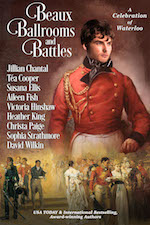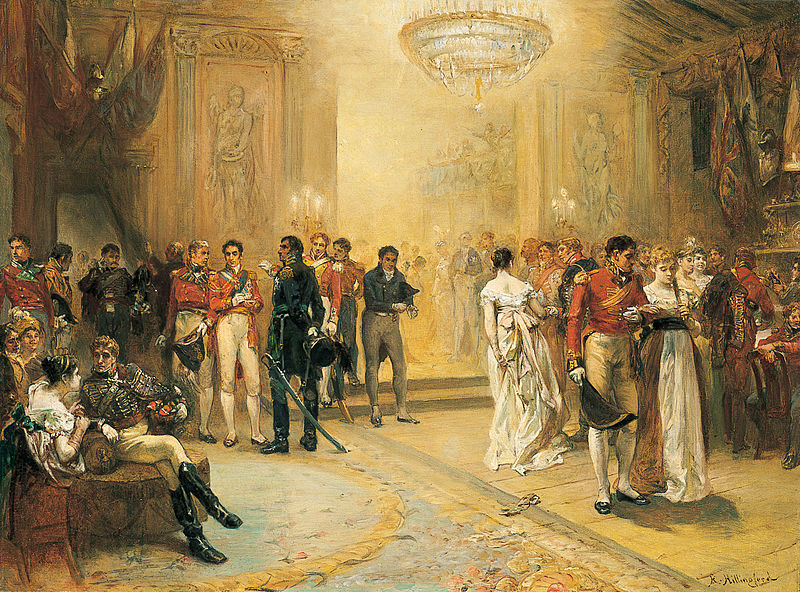
The escaped emperor had marched into Paris nearly three months ago. Rumors abounded that he was heading north, that he had crossed the border with Belgium, that his Grande Armée was enormous and would crush the ragtag allied army that Wellington was still assembling in Brussels. Frightened English citizens were fleeing to Antwerp to find a packet to England. Horses were scarce. Fear was running rampant through the city.
So why on earth would anyone decide to hold a ball that evening? Lady Richmond was the wife of Charles Lennox, 4th Duke of Richmond, who commanded a reserve force assigned to protect Brussels from a French invasion.
According to Lady Georgiana, a daughter of the Richmonds:
My mother’s now famous ball took place in a large room on the ground-floor on the left of the entrance, connected with the rest of the house by an ante-room. It had been used by the coach-builder, from whom the house was hired, to put carriages in, but it was papered before we came there; and I recollect the paper—a trellis pattern with roses. … At the ball supper I sat next to the Duke of Wellington, when he gave me an original miniature of himself painted by a Belgian artist.
Lady Louisa, another daughter of the Richmonds wrote this:
I well remember the Gordon Highlanders dancing reels at the ball. My mother thought it would interest foreigners to see them, which it did. I remember hearing that some of the poor men who danced in our house died at Waterloo. There was quite a crowd to look at the Scotch dancers.
Excerpts from Wellington: The Years of the Sword, Elizabeth Longford, 1969
The most famous ball in history was the climax of Wellington’s psychological warfare which always involved ‘pleasure as usual’. The question of holding it or not had first come up in May.
‘Duke,’ said the Duchess of Richmond one day, ‘I do not wish to pry into your secrets … I wish to give a ball, and all I ask is, may I give my ball? If you say, “Duchess, don’t give your ball”, it is quite sufficient, I ask no reason.’
‘Duchess, you may give your ball with the greatest safety, without fear of interruption.’ At that date, indeed, the Duke had intended to give a ball himself on 21 June, the second anniversary of the battle of Vitoria. Operations were not expected to begin before 1 July …
That very afternoon [the day of the ball] there had been a close run thing, though a small one, at Quatre Bras. Prince Bernhard of Saxe-Weimer with 4,000 infantry and eight guns had occupied on his own initiative the empty crossroads at Quatre Bras and had easily driven off 1,700 French skirmishers unsupported by artillery … Neither Ney nor Wellington knew anything of the crisis which had come and gone. Ney, only just recalled by Napoleon to his post from having been rusticated in the country, was still getting his bearings. All Wellington knew was that the Prince of Orange, who was now dancing at the ball, had reported all quiet on the Nivelles-Namur chaussée earlier in the day.
It has often been asked why Wellington did not cancel the ball at 3 p.m. instead of going to hear the fiddlers while Rome burned … Apart from Wellington’s extreme sensitivity to the chances of a stab in the back, his place was in Brussels. Having at last redirected his whole army towards Quatre Bras, nothing more remained for him to do that night. He was personally to lead out the reserve in the morning. Orders had still to be distributed among officers in Brussels and personal interviews held. Why not under the convenient camouflage and at the ready-made rendezvous of a ball? This was to be Wellington’s explanation to his friends during later post-mortems of Waterloo …
Morale-building, duty, convenience – they all played their part in getting Wellington at the ball. Why not admit that the Irish devil in him wanted to go? He would go; and see ‘those fellows’ damned …
The ball-room, situated on the ground floor of the Richmonds’ rented house in the rue de la Blanchissserie, had been transformed into a glittering palace with rose-trellised wallpaper, rich tent-like draperies and hangings in the royal colours of crimson, gold and black, and pillars wreathed in ribbons, leaves and flowers. Byron’s ‘lamps’ were the most magnificent chandeliers and the list of chivalry, if not beauty, was headed by H.R.H. the Prince of Orange, G.C.B. All the ambassadors, generals and aristocrats and dashing young officers were present …
Wellington arrived ‘rather late’ at the entrance, where streams of light poured through the open windows into the warm streets and over the thronged carriages. In the ball-room, those officers whose regiments were at any distance were already beginning to slip away quietly. The seventeen-year-old Lady Georgiana Lennox was dancing … She immediately broke off and went up to Wellington to ask whether the rumours were true …
‘Yes they are, we are off tomorrow.’ As this terrible news (Georgiana’s words) rapidly circulated, the ball-room was like a hive someone had kicked: an excited buzz arose from all the tables and elegantly draped embrasures.
… Lady Dalrymple-Hamilton, who sat for some time beside Wellington on a sofa, was struck by his preoccupied and anxious expression beneath the assumed gaiety. ‘Frequently, in the middle of a sentence he stopped abruptly and called to some officer, giving him directions, in particular to the Duke of Brunswick and Prince of Orange who both left the ball before supper’ [she later recalled to Sir Herbert Maxwell]. But even the lady on the sofa did not suspect the degree of drama with which the Prince of Orange’s departure was attended.
Shortly before supper … a dispatch was brought in … from Quatre Bras for the Prince of Orange. The message, dated about 10 p.m. that night, announced the repulse of Prussian forces from Fleurus on the road north-east of Charleroi, and less than eight miles as the crow flies from Quatre Bras. As soon as Wellington had read this enlightening but grim piece of news he recommended the prince to miss supper and return straight to his headquarters in the field.
… Wellington kept up an animated and smiling conversation for twenty minutes more, when a lesser man would have fled.
… At last, the necessary interval was up and Wellington turned casually towards the Duke of Richmond.
‘I think it is time for me to go to bed likewise …’ The party rose and moved into the hall.
A few notable attendees
· Prince of Orange, unsuccessful suitor of the Prince Regent’s daughter, Princess Charlotte, nicknamed “Slender Billy”
· Prince Frederick of Orange, younger brother of the Prince of Orange, who had command of a fall-back position near Braine during the battle
· Duke of Brunswick, brother of Caroline, estranged wife of the Prince Regent. He left the ball eager to show off his fighting ability and was killed the next day.
· General Alava of Spain, who holds the distinction of having fought at Trafalgar (against Wellington) and Waterloo (with Wellington, as the envoy of King William I of the Netherlands
· The Earl and Countess Conyngham and their daughter Lady Elizabeth (Lady Conyngham was George IV’s last mistress)
· The Duke of Wellington
· Mr. and Lady Frances Webster (who reportedly had a fling with the duke in Brussels)
· Sir Henry and Lady Susan Clinton. Sir Henry’s father was commander-in-chief of the British forces during the American Revolution. Sir Henry was Lieutenant-General and commanded the 2nd Division.
· The Earl of Uxbridge, second in command to Wellington, who commanded the cavalry. The leg he lost became somewhat of a tourist attraction.
· The Earl of March, Charles Lennox-Gordon, son of the hosts of the ball, who was aide-de-camp to the Prince of Orange.
· Lieutenant-General Thomas Picton, who commanded the 5th Division, killed at Waterloo.
Below: The Duchess of Richmond's Ball by Hillingford

Beaux, Ballrooms, and Battles: A Celebration of Waterloo
June 18, 1815 was the day Napoleon Bonaparte's Grande Armée was definitively routed by the ragtag band of soldiers from the Duke of Wellington's Allied Army in a little Belgian town called Waterloo. The cost in men's lives was high—22,000 dead or wounded for the Allied Army and 24,000 for the French. But the war with Napoleon that had dragged on for a dozen years was over for good, and the British people once more felt secure on their island shores.
The bicentenary of the famous battle seemed like an excellent opportunity to use that setting for a story, and before I knew it, I had eight other authors eager to join me, and to make a long story short, on April 1, 2015 our Waterloo-themed anthology was released to the world.
You are all invited to
· our Website and Facebook Page
· our Rafflecopter (ends April 18th) -- Giveaway
1 Beaux, Ballrooms, and Battles mug (above)
Our Stories:
Jillian Chantal: Jeremiah’s Charge
Emmaline Rothesay has her eye on Jeremiah Denby as a potential suitor. When Captain Denby experiences a life-altering incident during the course of events surrounding the Battle of Waterloo, it throws a damper on Emmaline’s plans.
Téa Cooper: The Caper Merchant
The moon in Gemini is a fertile field of dreams, ideas and adventure and Pandora Wellingham is more than ready to spread her wings. When Monsieur Cagneaux, caper merchant to the rich and famous, introduces her to the handsome dragoon she believes her stars have aligned.
Susana Ellis: Lost and Found Lady
Catalina and Rupert fell in love in Spain in the aftermath of a battle, only to be separated by circumstances. Years later, they find each other again, just as another battle is brewing, but is it too late?
Aileen Fish: Captain Lumley’s Angel
Charged with the duty of keeping his friend’s widow safe, Captain Sam Lumley watches over Ellen Staverton as she recovers from her loss, growing fonder of her as each month passes. When Ellen takes a position as a companion, Sam must confront his feelings before she’s completely gone from his life.
Victoria Hinshaw: Folie Bleue
On the night of the 30th Anniversary of the Battle of Waterloo, Aimée, Lady Prescott, reminisces about meeting her husband in Bruxelles on the eve of the fighting. She had avoided the dashing scarlet-clad British officers, but she could not resist the tempting smile and spellbinding charm of Captain Robert Prescott of the 16th Light Dragoons who— dangerously to Aimée— wore blue.
Heather King: Copenhagen’s Last Charge
When Meg Lacy finds herself riding through the streets of Brussels only hours after the Battle of Waterloo, romance is the last thing on her mind, especially with surly Lieutenant James Cooper. However, their bickering uncovers a strange empathy – until, that is, the lieutenant makes a grave error of judgment that jeopardizes their budding friendship...
Christa Paige: One Last Kiss
The moment Colin held Beatrice in his arms he wanted one last kiss to take with him into battle and an uncertain future. Despite the threat of a soldier’s death, he must survive, for he promises to return to her because one kiss from Beatrice would never be enough.
Sophia Strathmore: A Soldier Lay Dying
Amelia and Anne Evans find themselves orphaned when their father, General Evans, dies. With no other options available, Amelia accepts the deathbed proposal of Oliver Brighton, Earl of Montford, a long time family friend. When Lord Montford recovers from his battle wounds, can the two find lasting love?
David W. Wilkin: Not a Close Run Thing at All
It had been a decade. Now, Robert had come back into her life, shortly before battle was to bring together more than three hundred thousand soldiers. They had but moments after all those years, and now, would they have any more after?

Excerpt from "Lost and Found Lady"
by Susana Ellis
September 14, 1793
A beach near Dieppe, France
“I don’t like the look of those clouds, monsieur,” Tobias McIntosh said in fluent French to the gray-bearded old man in a sailor hat waiting impatiently near the rowboat that was beginning to bob more sharply with each swell of the waves. “Are you sure your vessel can make it safely all the way to Newhaven in these choppy seas?”
The old man waved a hand over the horizon. “La tempête, it is not a threat, if we leave immédiatement. Plus tard…” He shrugged. “Je ne sais pas.”
“Please, mon amour,” pleaded the small woman wrapped in a hooded gray cloak standing at his side. “Allow me to stay with you. I don’t want to go to England. I promise I will be prudent.”
A strong gust of wind caught her hood and forced it down, revealing her mop of shiny dark locks. Tobias felt like seizing her hand and pulling her away from the ominous waves to a place of safety where she and their unborn child could stay until the senseless Terreur was over.
“Justine, ma chère, we have discussed this endlessly. There is no place in France safe enough for you if your identity as the daughter of the Comte d’Audet is discovered.” He shivered. “I could not bear it if you were to suffer the same fate at the hands of the revolutionaries as your parents did when I failed to save them.”
She threw her arms around him, the top of her head barely reaching his chin. “Non, mon amour, it was not your fault. You could not have saved them. It was miraculeux that you saved me. I should have died with them.”
She looked up to catch his gaze, her face ashen. “Instead, we met and have had three merveilleux months together. If it is my time to die, I wish to die at your side.”
Tobias felt like his heart was going to break. His very soul demanded that the two of them remain together and yet… there was a price on both their heads, and the family of the Vicomte Lefebre was waiting for him in Amiens, the revolutionaries expected to reach them before midday. It was a dangerous work he was involved in—rescuing imperiled French nobility from bloodthirsty, vengeful mobs—but he had pledged himself to the cause and honor demanded that he carry on. And besides, there was now someone else to consider.
“The child,” he said with more firmness than he felt. “We have our child to consider, now, Justine ma chère. The next Earl of Dumfries. He must live to grow up and make his way in the world.”
Not to mention the fact that Tobias was human enough to wish to leave a child to mark his legacy in the world—his and Justine’s. He felt a heaviness in his heart that he might not live long enough to know this child he and Justine had created together. He could not allow his personal wishes to undermine his conviction. Justine and the child must survive.
Justine’s blue eyes filled with tears. “But I cannot! I will die without you, mon cher mari. You cannot ask it of me!”
“Justine,” he said, pushing away from her to clasp her shoulders and look her directly in the eye. “You are a brave woman, the strongest I have ever known. You have survived many hardships and you can survive this. Take this letter to my brother in London, and he will see to your safety until the time comes that I can join you. My comrades in Newhaven will see that you are properly escorted.”
He handed over a letter and a bag of coins. “This should be enough to get you to London.”
After she had reluctantly accepted and pocketed the items beneath her cloak, he squeezed her hands.
“Be sure to eat well, ma chère. You are so thin and my son must be born healthy.”
She gave him a feigned smile. “Our daughter is the one responsible for my sickness in the mornings… I do not believe she wishes me to even look at food.”
She looked apprehensively at the increasingly angry waves as they tossed the small boat moored rather loosely to a rock on the shore and her hands impulsively went to her stomach.
“Make haste, monsieur,” the old sailor called as he peered anxiously at the darkening clouds. “We must depart now if we are to escape the storm. Bid your chère-amie adieu maintenant or wait for another day. I must return to the bateau.”
thanks “Tobias,” she said, her voice shaking.
He wondered if he would ever again hear her say his name with that adorable French inflection that had drawn him from their first meeting.
“Go, Justine. Go to my family and keep our child safe. I promise I will join you soon.”
He scooped her up in his arms and carried her toward the dinghy, trying to ignore her tears. The old sailor held the boat as still as he could while Tobias placed her on the seat and kissed her hard before striding back to the shore, each footstep heavier than the last.
He studied the darkening sky as the sailor climbed in the boat. “You are sure it is safe?”
“La Chasseresse, she is très robuste. A few waves will not topple her, monsieur.”
“Je t’aime, mon amour,” she said to him plaintively, her chin trembling.
“Au revoir, ma chère,” he said, trying to smile, although his vision was blurring from tears.
Will I ever see her again?
He stood watching as the dinghy made its way slowly through the choppy sea to the larger ship anchored in the distance, grief-stricken and unable to concentrate on anything but his pain. When the ship finally sailed off into the horizon, he fell to his knees and prayed as he had never done before for the safety of his beloved. He remained in that position until drops of rain on his face reminded him of the Lefebre family waiting for him in Amiens.
With a deep breath, he rose and made his way to the nearby forest, where his horse waited, tied to a tree.
“Come, my friend. We have a long, wet journey ahead of us.”
Setting foot in the stirrup, he swung his leg over the saddle and urged the horse to a gallop, feeling his heart rip into pieces with every step away from his beloved.
Susana has always had stories in her head waiting to come out, especially when she learned to read and her imagination began to soar. Voracious reading led to a passion for writing, and her fascination with romance and people of the past landed her firmly in the field of historical romance.
A teacher in her former life, Susana lives in Toledo, Ohio in the summer and central Florida in the winter. She is a member of the Central Florida Romance Writers and the Beau Monde chapters of RWA and Maumee Valley Romance Inc.
Thanks, Susana... Visiter here by clicking below:
Website • Facebook • Twitter
Susana’s Parlour • Susana’s Morning Room


 RSS Feed
RSS Feed